When the scorching summer heat hits, the last thing you want is for your Mercedes-Benz air conditioner to malfunction. Whether it’s blowing warm air or not functioning at all, your car’s AC system is crucial for comfort during long drives.
Proper AC repair is not only essential for comfort but also for the long-term efficiency of the vehicle’s system. If not addressed, small issues can lead to costly repairs later.
Approximately 30% of vehicles with air conditioning problems need a refrigerant recharge or leak repair, highlighting the need for timely repairs and maintenance.
However, when issues arise, you may be left wondering whether to attempt a DIY repair or seek professional AC repair services. Let’s guide you through key considerations for Mercedes-Benz AC repair. Additionally, some essential tips to keep your cars air conditioning system running efficiently.

Key Takeaways:
- Common Mercedes-Benz AC issues include refrigerant leaks, compressor failure, and weak airflow.
- DIY repairs may lead to further damage, especially with complex parts like the compressor and condenser.
- Professional repairs ensure accurate diagnosis, use of OEM parts, and proper refrigerant management.
- Regular maintenance prevents costly AC repairs in the future.
Common Mercedes-Benz AC Problems
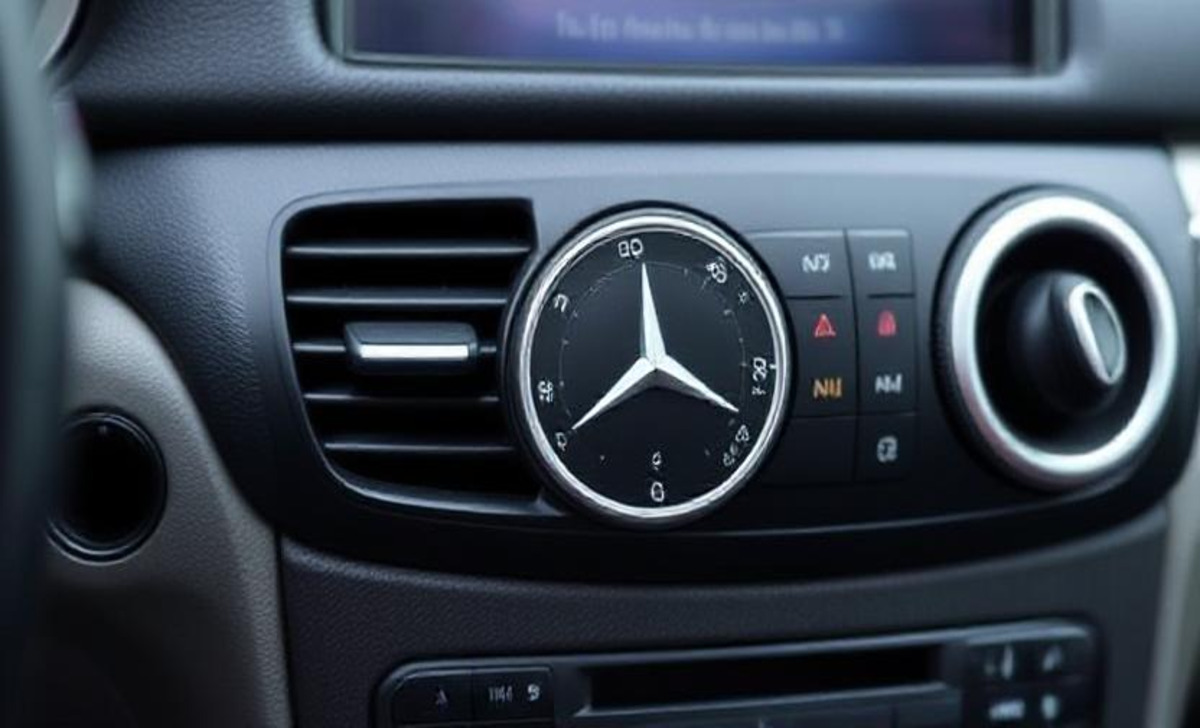
Your Mercedes-Benz’s air conditioning system consists of various interconnected parts like the compressor, condenser, evaporator, and expansion valve. Problems with any of these components can lead to poor air conditioning performance or complete failure. Common issues include:
- Refrigerant Leaks: A freon leak can reduce cooling efficiency and even damage the compressor over time.
- Compressor Failure: If your Mercedes-Benz AC compressor malfunctions, it can’t pressurize the refrigerant, and your AC system won’t cool properly.
- Clogged or Damaged Condenser: The AC condenser helps convert refrigerant into a liquid form for cooling. A damaged or clogged condenser will lead to inefficient cooling.
- Faulty Expansion Valve or Orifice Tube: These parts control the flow of refrigerant in the system. If they malfunction, your AC system will struggle to maintain proper cooling.
- Weak Airflow: If airflow is weak, the problem could be a malfunctioning blower motor or clogged air conditioning vents.
DIY Mercedes-Benz AC Repair: Is It Worth The Risk?
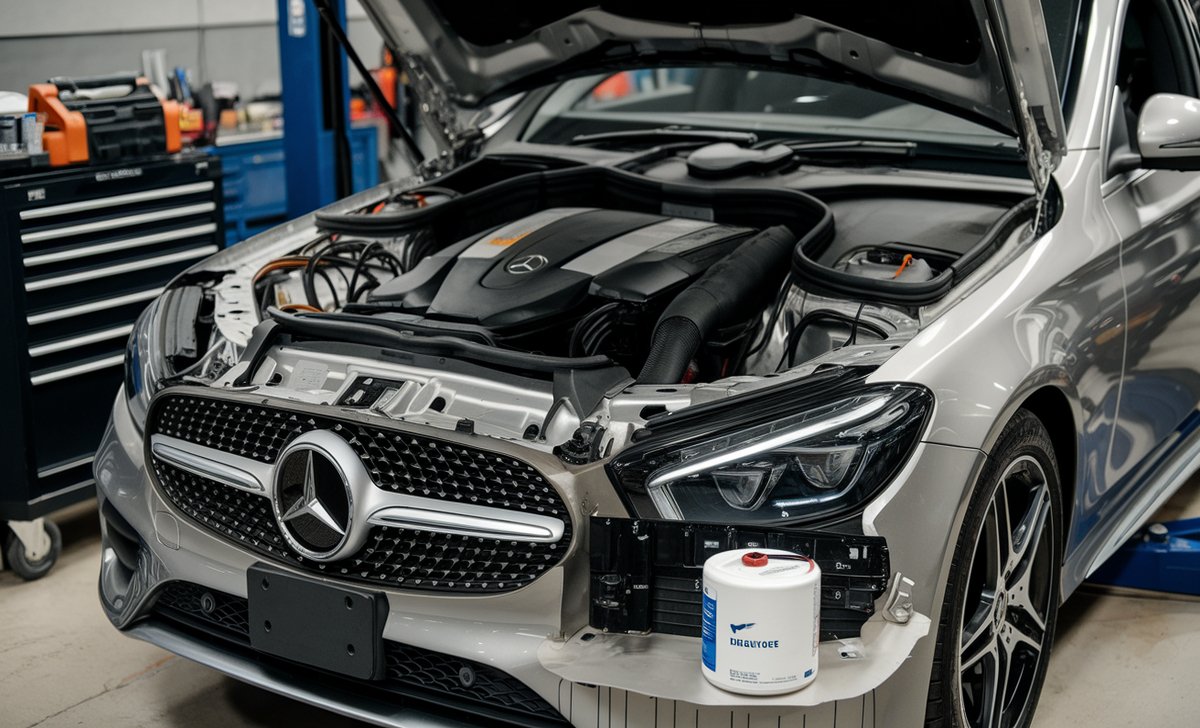
For many car owners, DIY repairs are tempting, especially when it comes to saving money on auto repairs. However, when it comes to your vehicle’s air conditioning, DIY repairs may not always be the best option. Here are a few things to consider:
1. Refrigerant Recharge
One of the most common DIY AC fixes is the freon recharge. If your Mercedes-Benz’s AC is blowing warm air, a freon leak or low refrigerant could be the cause. Many car owners attempt a DIY AC recharge by purchasing refrigerant and following the instructions.
However, refrigerant recharging isn’t always a simple process, as it involves knowing the correct type of refrigerant (R134A or other types), the proper refrigerant circulation, and ensuring that no leaks are present in the system. Failing to address refrigerant leaks properly can lead to additional damage to your AC compressor or AC condenser.
2. Ac Compressor Troubleshooting
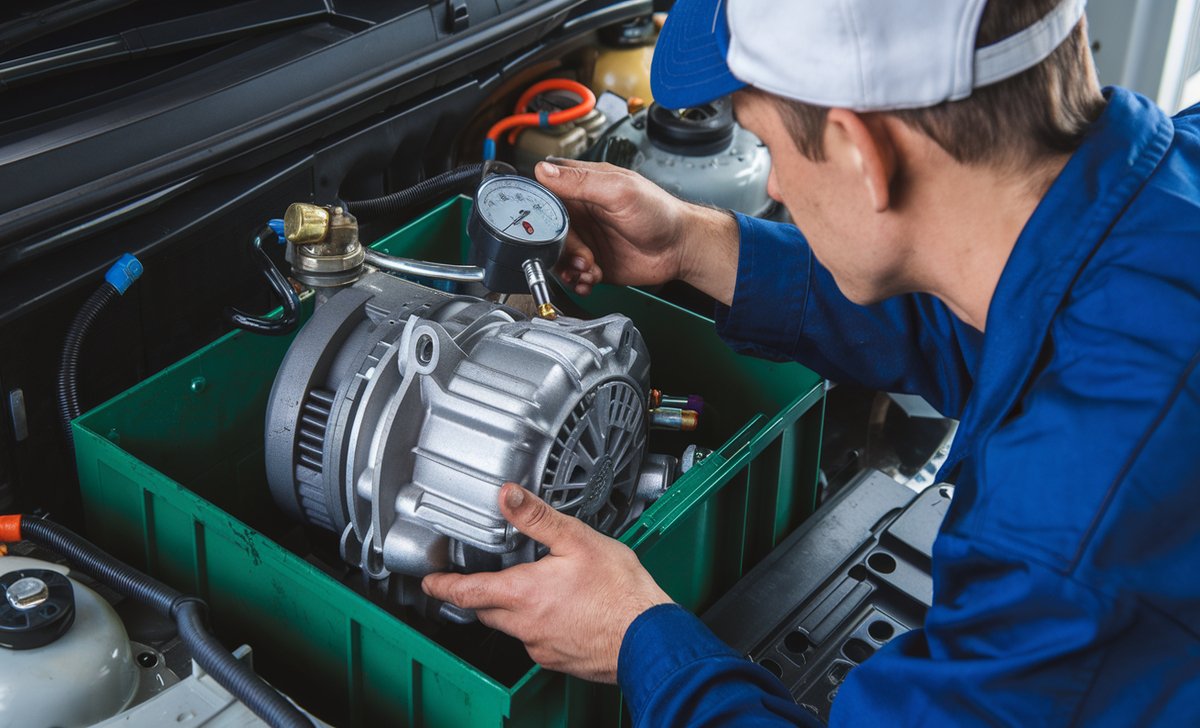
A malfunctioning AC compressor is often a complex issue that can lead to extensive repairs. While it’s possible to replace a faulty compressor, this requires expertise in the AC system and the use of proper OEM parts. Without this knowledge, you risk causing further damage, especially if you don’t address pressure switches or AC system parts like the thermal expansion valve.
3. Identifying Leaks And Damaged Hoses
A damaged hose or leaks can lead to a loss of refrigerant, making your AC system inefficient. While refrigerant leak detection can be done with a UV dye, the real challenge is identifying the source of the leak. Professional repair technicians use diagnostic tools to find hidden leaks that may not be easily visible to the untrained eye. Without this equipment, you may spend hours only to fix part of the issue, leaving the AC unit still malfunctioning.
4. Lack Of Expertise

Working with the compressor, AC condenser, and expansion tube requires experience. If you’re not trained, it’s easy to misdiagnose the issue, resulting in unnecessary repairs and costly auto AC repairs down the line. For example, not correctly diagnosing the thermal expansion valve could result in improper refrigerant flow, leading to further damage to your system.
Why Professional Service Is The Safer Option
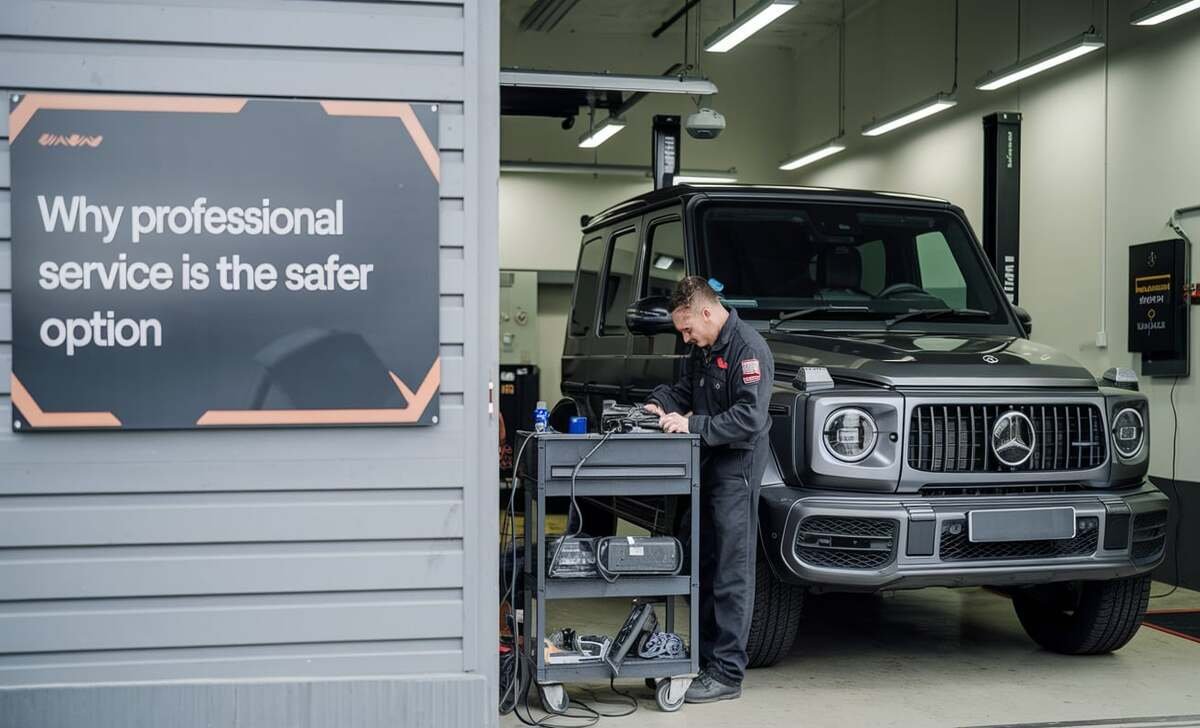
While DIY repairs may seem cost-effective at first, professional service ensures that the job is done right the first time. Expert technicians are trained to diagnose and repair Mercedes-Benz air conditioning issues accurately. Here are several benefits of opting for professional AC repair services:
1. Thorough Diagnostics
Trained technicians use specialized tools and diagnostic equipment to pinpoint the root cause of your AC problems. For example, they can use pressure switches to measure the performance of the AC compressor or check refrigerant levels to identify leaks in the system. These methods allow for a complete and accurate diagnosis, avoiding the trial-and-error approach common with DIY repairs.
2. OEM Parts For Reliable Repair
Professional services use OEM parts to replace worn-out components in your AC system, ensuring that your repairs are of the highest quality.
If your AC condenser or compressor requires replacing, using non-OEM parts could lead to poor performance, inefficiency, or even further damage. Genuine parts help maintain the longevity and efficiency of your Mercedes-Benz air conditioning system.
3. Proper Refrigerant Management
Handling refrigerants requires specific knowledge. Overcharging or undercharging the system can cause damage to critical components such as the AC compressor or expansion valve. A professional AC repair service will ensure proper refrigerant levels, balancing the AC system for maximum performance and avoiding long-term issues.
4. Routine Maintenance And Longevity
Regular maintenance, such as checking refrigerant levels, inspecting AC vents, and cleaning the condenser, is essential for keeping your AC system running smoothly. A professional service will ensure that your AC unit is well-maintained, helping to prevent future breakdowns and the need for extensive repairs.
5. Leak Detection And Prevention
Leaks in the AC system, such as a freon leak or damage to connecting hoses, are common causes of AC failure. Professional service technicians use advanced methods, such as UV dye injections and blacklight inspection, to locate and fix these leaks.
Proper leak detection ensures that your Mercedes-Benz air conditioner functions effectively, avoiding unnecessary freon recharge and compressor damage in the future.
Cost-Effective And Efficient AC Repairs
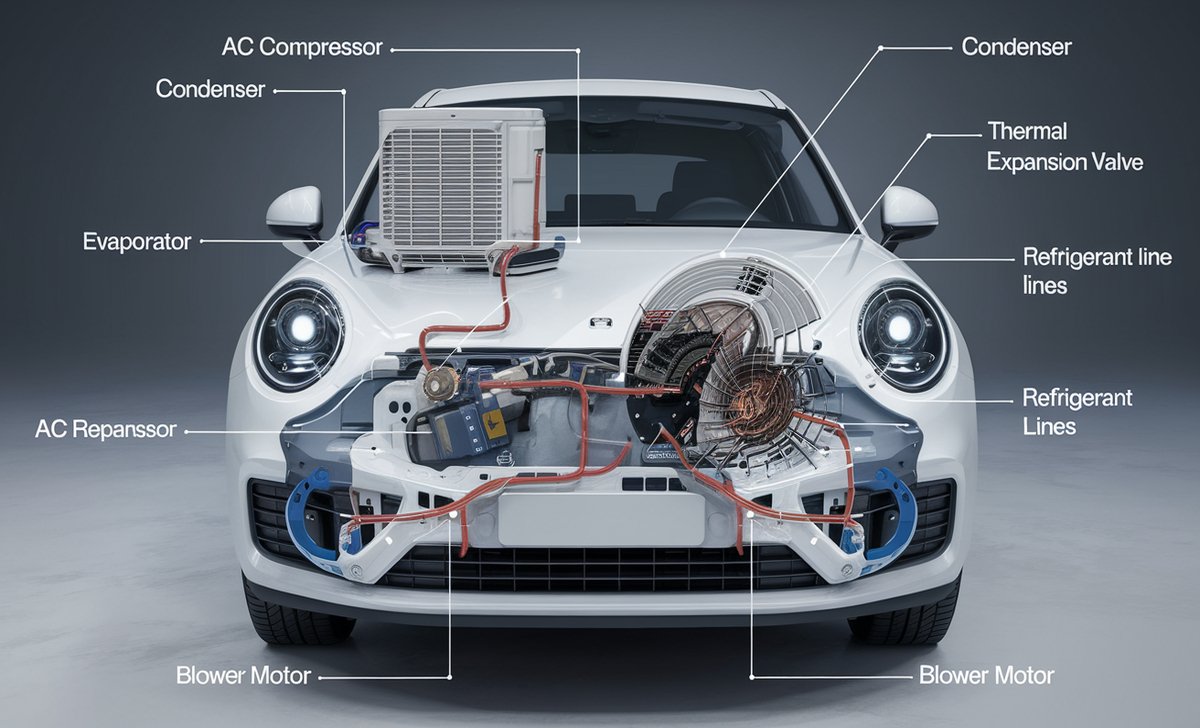
While professional repairs may come at a higher upfront cost, they are often more cost-effective in the long run. DIY repairs can lead to mistakes, causing further damage that might require extensive repairs later.
Professional service addresses the problem accurately, preventing additional costs related to damaged hoses, faulty compressors, or leaks.
| Service | Estimated Cost |
| AC System Recharge | $150 – $300 |
| AC Compressor Replacement | $600 – $1,200 |
| AC Condenser Replacement | $400 – $1,000 |
| Evaporator Replacement | $600 – $1,500 |
| Thermal Expansion Valve | $200 – $450 |
| Refrigerant Leak Repair | $200 – $1,000+ |
| Blower Motor Replacement | $400 – $800 |
| AC System Flush | $150 – $300 |
Additional Cost Factors:
- Labor Costs: Typically $75 – $150 per hour, varying by shop and location.
- Vehicle Model: Luxury or complex models may incur higher repair costs.
- OEM vs. Aftermarket Parts: OEM parts are pricier than aftermarket alternatives.
- Location: Costs can vary based on your geographic area and local market conditions.
The cost of repairing your Mercedes-Benz AC system depends on which components need attention. Routine services like a recharge are more affordable, but replacing major components like the compressor or evaporator can be more costly. Always ensure you’re working with a certified Mercedes-Benz technician who can estimate your vehicle’s specific needs accurately.
Conclusion
Professional service is often the best option for your Mercedes-Benz air conditioning system. Trained technicians ensure accurate diagnosis, use high-quality OEM parts, and correctly handle refrigerants and AC components. Opting for professional repair services not only restores your comfort but also prevents costly auto AC repairs in the future.
If you’re experiencing AC problems with your Mercedes-Benz, don’t hesitate to schedule an auto AC repair appointment with a trusted service provider. Routine maintenance will ensure your air conditioning system remains in top condition, keeping you cool during the hottest months.
Frequently Asked Questions
1.How Often Should I Service My Mercedes-Benz Air Conditioning?
It’s recommended to service your vehicle’s AC system at least once a year, ideally before the summer season, to ensure optimal performance and avoid any unexpected AC repair needs.
2.What Are The Signs That My Car’s Air Conditioning Needs Repair?
Common signs include warm air from the AC, weak airflow, strange smells, or unusual noises. If you experience any of these, it’s time to schedule a professional air conditioning repair.
3.Can I Fix My Mercedes-Benz AC Myself?
While some minor issues, like recharging the refrigerant, can be handled by DIY enthusiasts, most AC problems require the expertise of trained technicians to diagnose and repair. DIY repairs can risk further damage to the system.
4.How Do I Know If My AC Has A Refrigerant Leak?
A drop in cooling performance is usually a sign of a refrigerant leak. Professional technicians can detect leaks using UV dye and pressure testing.
5.What Is The Cost Of A Freon Recharge For My Mercedes-Benz?
The cost of a freon recharge varies depending on the vehicle model and whether additional repairs, such as fixing damaged hoses or replacing the compressor, are required.
6.How Many Cans Of Freon Does A Car Take?
Most cars require 2 to 3 12oz cans of refrigerant (R134A) for a recharge. Larger vehicles or rear AC systems may require more. Always check the vehicle’s manual for the exact amount needed.
7.How Much Does It Cost To Fix Your Air Conditioner?
The cost to fix a car’s AC can range from $150 to $1,500+, depending on the issue. Minor fixes, like recharging refrigerant, are cheaper, while compressor or condenser replacements are more expensive.
8.How Much Does It Cost To Fix AC In Mercedes?
Fixing the AC in a Mercedes-Benz can range from $400 to $1,500+. Simple tasks like refrigerant recharges are less costly, while more complex repairs like compressor or condenser replacements can be pricier.
9.Where Can You Find A Reliable Mercedes-Benz AC Repair Service?
Reliable Mercedes-Benz AC repair services can be found at authorized dealerships, specialized auto repair shops, or independent mechanics with experience working on Mercedes-Benz vehicles. Always choose certified technicians for quality service.